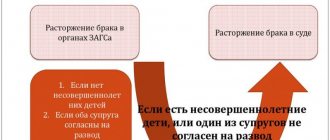In what cases can you apply for alimony without divorce?
Current family law regulates the following alimony obligations between:
- Children (natural/adopted) and parents - Ch. 13 IC RF.
- Spouses - Ch. 14 RF IC.
In both cases, divorce is not necessary. The grounds for collection here will be the failure to reach an agreement on the payment of alimony and the lack of voluntary material maintenance in the marriage on the part of:
- Parent in relation to the child - clause 2 of Art. 80 IC RF.
- Spouse - clause 2 of Art. 89 RF IC.
In the latter case, in addition to the above grounds, the following is added:
- The most stable financial position of the future payer of payments.
- Simultaneous disability and neediness of the applicant.
- Carrying/caring for a child after birth until age 3.
- The need of a guardian caring for a shared child with a disability until the latter reaches the age of majority, or indefinitely if the child has been disabled since childhood, group 1.
The law also provides for alimony for a pregnant wife if the following conditions are met:
- The marriage is officially registered.
- The husband refuses to support his wife financially.
- The child that is about to be born is shared.
- The child's father is able to help.
To agree on payment, the woman must have a confirmed disability.
Important! You can apply for alimony for minors/incapacitated children at any time - from birth until they reach adulthood/gain legal capacity.
Is it possible to receive alimony from maternity payments if the husband is on maternity leave?
There are many pitfalls that your spouse should be aware of.
Often, maternity leave or parental leave is used by men as an opportunity to avoid paying alimony from child care benefits (for example, for older children from their first marriage).
If there is no documentation indicating a certain amount to be withheld, or additional income from a man on maternity leave, then it is possible that the court will refuse to receive financial assistance. No earnings - no alimony!
The only point that a woman can use to her advantage is if her husband has not notified the bailiff about the fact that he is on maternity leave. Then an amount of twenty percent may be withheld from him, taking into account the average salary. Of course, a man has the right to challenge the court's decision.
How can you apply for payments in court?
If a parent does not provide for his children, funds for their maintenance can be recovered in court through writ or lawsuit proceedings, even while married - clause 2 of Art. 80 RF IC, art. 122 Code of Civil Procedure of the Russian Federation).
You can submit an application in two ways:
- Statement of claim for alimony.
- Applications for a court order - this option is quite unstable, since such a judicial act can be canceled by the court at the request of a potential payer.
File a claim in cases where the demand for collection of payments is made - clause 3 of the RF Supreme Court No. 56):
- Related to establishing paternity or the need to involve other interested parties.
- Formulated in a fixed monetary amount or simultaneously in shares and a fixed amount.
Guarantee of alimony payment
What are the guarantees that after all legal proceedings the monthly maintenance will be paid? This question worries many. The bailiff service will monitor the execution of the court order.
If the plaintiff or defendant does not agree with the decision made by the judge, it can be appealed. This must be done within the period established by law. If there is no appeal, then everyone agrees with the decision, therefore, the determination can be sent to the bailiffs for execution.
How much can you collect alimony for children and spouse?
The amount of alimony payments depends on the number of children and is - Art. 81 RF IC:
- One child - ¼ of the parent’s salary and other income (25%).
- Two - ⅓ part (33%).
- Three or more - ½ part (50%).
The size of the payer’s income also influences the amount of payments - the higher it is, the more the child will receive. This option is appropriate if the parent receives a good “white” salary. If the earnings are unofficial/arrived irregularly, in the interests of the children, they choose the second method of calculating payments in a fixed amount of money.
A fixed amount of alimony is awarded in the following cases:
- The defendant has no official income.
- His income is irregular.
- Recovery as a share (percentage) of the payer’s income is impossible/difficult or significantly violates the interests of one of the parties.
The court can also determine the amount of alimony both in shares and in a fixed sum of money.
Alimony payments are calculated from the following income:
- Salaries/stipends/pensions.
- Monetary allowances for the military/Rosguard/police/other law enforcement agencies.
- Unemployment benefits.
- Cash allowance for officials of municipal/state structures.
- Employer payments in connection with vacation/bonus/incentives.
- Income from commercial activities.
- Payments under civil contracts.
- Rent.
- Dividends.
- Other.
Mortgage and alimony
The presence of financial obligations under the mortgage agreement does not affect the amount of alimony benefits that must be paid to the payer. Whatever the size of the monthly loan payment, the amount of money for alimony is calculated from the total salary or other earnings of the obligated person, and not from the amount remaining after the mortgage payment.
The financial burden of the alimony holder can be eased if the following conditions are simultaneously met:
- The mortgage agreement was signed after the marriage. In this case, the housing pledged to the bank is legally considered a jointly acquired asset of the wife and husband.
- Credit housing and mortgage debt are divided between the former spouses.
In this case, the payer, whose role is most often the father, gets the opportunity to reduce debt obligations, as a rule, by 2 times, since residential real estate is usually divided in half in court.
What does the procedure for applying for alimony during marriage include?
The procedure for filing a claim/application for a court order involves the following:
- Selecting a collection procedure.
- Determining the place and method of circulation.
- Drawing up a claim/application for a court order. To complete a notarial agreement, you need to make an appointment with a notary.
- Formation of the appropriate package of documents.
- Submitting an application/claim to the court/visiting a notary at the time appointed for you.
- Receipt of the act after entry into legal force: court decision - after 30 days / court order - 10 days from the date of receipt by the payer / notarial agreement - immediately.
Going to court
If you cannot draw up an agreement or do not want to, then your issue can be resolved through the court. To do this, you will have to prepare a statement of claim. Then take it to the magistrate’s station and wait for a court hearing to be scheduled.
At the first hearing, the judge will find out all the important circumstances in your case. In addition, all parties will be interviewed. The court needs to understand the position of the plaintiff and defendant. If no disputes or disagreements arise, a decision will be made.
Attach to the statement of claim the same documents that are needed for the notarial agreement.
How to make an application
The legislation does not provide for a unified form of application for the issuance of a court order/claim for the collection of alimony. When drawing up the document, the individual situation of the spouses and certain nuances are taken into account.
The requirements for the form and content of the claim are defined in Art. 131 of the Code of Civil Procedure of the Russian Federation, applications for the issuance of a court order - in Art. 124 Code of Civil Procedure of the Russian Federation.
The claim consists of the following parts:
- Introductory - name of the court, address, information about the plaintiff and defendant (full name, place of residence, contact phone number). For the defendant, one of the identifiers (SNILS, INN, etc.) is also indicated. The name of the document is a statement of claim for the recovery of child support.
- Descriptive and motivational - it indicates the circumstances that are relevant to the case, information about the current situation with the child’s financial support, the substantiation of the claims with references to the norms of legislative acts. When collecting alimony in a fixed amount, the full calculation of payments is also indicated.
- Final (petition) - the claim for the recovery of alimony from the defendant is formulated, the petitions are stated, as well as a list of appendices to the claim. The document is signed by the applicant/representative by proxy and dated.
An application for a court order is drawn up similarly to a claim. However, the petition part indicates a requirement not for the collection of alimony, but for the issuance of a court order.
What documents will be needed
To go to court to collect alimony, in addition to the application/claim, you will need:
- A copy of the plaintiff's passport.
- Marriage certificate.
- Birth certificates of children. If they are over 14 years old, their passports will be required.
- Certificate of persons registered with the child (if the parents live separately).
- Documentation confirming the income of the plaintiff and defendant (if available).
- Bank details for transferring funds.
- Information about the presence/absence of deductions from the defendant’s salary.
- Documents confirming the sending of the claim with attachments to the defendant.
In some cases it may be necessary to provide:
- Evidence confirming the fact of cohabitation between the plaintiff and the defendant (if the latter disputes it).
- Medical documentation about the applicant's health status.
- Confirmation that the plaintiff has taken measures to collect funds.
- Power of attorney when submitting an application by a representative.
- Other information relevant to the case.
Attention! In each specific situation, an individual package of documentation is formed. Its exact list depends on the circumstances of the case and may be supplemented by other documents.
Read more about how to apply for alimony during marriage and the necessary documents on the website tvoepravo.com
Where are documents submitted?
A statement of claim for the recovery of child support is filed with the district/city court at the place of residence of the plaintiff or defendant - clause 2 of the RF Supreme Court No. 56.
To recover alimony payments for her maintenance, the spouse should apply to the defendant’s place of residence - Art. 28 Code of Civil Procedure of the Russian Federation. If his place of residence is unknown, the claim is brought at the location of the spouse’s property or at the last known address - Art. 29 Code of Civil Procedure of the Russian Federation.
To obtain a court order, contact the magistrates at the place of residence of yourself or the defendant.
Important! You can only collect alimony for your spouse in a fixed amount of money. Therefore, the application should be submitted in the manner of claim proceedings - Art. 122 Code of Civil Procedure of the Russian Federation.
What methods are available to apply?
You can file a claim/application in court in the following ways:
- By personally contacting the court office, ask to put a mark indicating acceptance of the application on your copy.
- Through a representative - for this he must have a power of attorney.
- By mail - be sure to keep the shipping receipt and an inventory of the attachment.
- Through the electronic service of State Automated System “Justice”.
How to apply online
To submit documents via the Internet, follow the following procedure:
- File a claim and scan the documents included in the application.
- Log in to your account using your State Services account.
- Select “Submit an appeal” and click “Application”.
- Select a subject of the Russian Federation and the name of the court to file a claim.
- Attach the statement of claim and the attached scanned documents.
- Click on “Generate an application” and complete the operation.
After which the status of the application can be tracked in the “Application History” section.
Peaceful agreement
The issue of alimony payments can be resolved quickly and without significant financial expenditure on fees and legal services thanks to an agreement concluded by mutual consent between the wife and husband.
The convenience of an alimony agreement for the recipient is that if the payer refuses to fulfill the agreements, the recipient can apply this document to the court with a request to issue a writ of execution. In this case, the recipient does not need to initiate legal proceedings and spend 1 month on the proceedings. The writ of execution is usually provided to the injured party within 1 week.
This document must be in writing and notarized. Without a notary's signature, the agreement cannot have any legal force and is considered invalid.
The agreement must address the following issues:
- Amount of alimony allowance.
- Form and frequency of alimony payments.
- Duration of the agreement.
- Actions that should be taken by the interested party in order to terminate or change the terms of the agreement.
- Possibility of indexation of alimony payments. This item is optional.
The parties to this agreement can independently specify in the document one of the following methods for calculating the amount of alimony benefits and establish the frequency of contributions in favor of the recipient. When discussing the conditions, keep in mind that the amount of alimony payments cannot be lower than the level established in Article 81 of the Family Code.
| Forms of payment of alimony benefits | Calculation procedure |
| Percentage of earnings | Similar to what is written in the table in the chapter on child support payments. |
| Fixed amount of money (periodic) | Can be transferred monthly, annually or at other intervals according to mutual agreement of the parties. |
| Fixed amount of money (lump sum) | The money is given to the recipient immediately after the agreement is notarized or provided in installments, the terms of which are negotiated by the parties. |
| Transfer of property | In this case, the payer transfers ownership of part of the property belonging to him to the recipient, and in return the recipient waives alimony claims in the future. |
Before visiting a notary, you must prepare the following documents:
- Passports of the recipient and payer.
- Certificates certifying the birth of children. They are needed if alimony will be transferred by the payer in favor of the children.
- Text of the drawn up agreement. Keep in mind that you do not need to write the agreement yourself, since the notary office provides visitors with a blank form and an example of a ready-made agreement, on the basis of which you can draw up your own document. However, in order not to overpay for notary services, you can prepare an agreement at home, using a sample from the Internet as a basis.
- A tax return, a salary certificate, an agreement on the provision of royalties for authorship, or another document about the payer’s income.
After the agreement has been prepared, the notary will read it out loud for the parties to the agreement. If the wife and husband have no questions about the contents of the agreement, the notary certifies it and accepts payment for services equal to 250 rubles.
FAQ
Q: Is it possible to file for spousal support without divorce for 2 children?
A: It is possible, provided that the potential alimony payer has blood relationship/adoptive parent status. The number of children does not matter.
Q: Is it possible to collect alimony during marriage if the husband does not officially work?
A: If your spouse is not officially employed/does not work at all, you still have the right to file for recovery of payments. Lack of income in itself is not a legal basis for avoiding supporting one’s needy/disabled relatives. In this case, payments are collected by the court in a fixed fixed amount.
Q: Is it possible to apply for alimony in a civil marriage?
A: It will not be difficult to collect money for the maintenance of a minor if paternity is confirmed in relation to him. If this fact has not been established, you will first need to prove paternity. However, it will not be possible to recover payments for the maintenance of the woman, since for this you need to have the status of a spouse (Article 89 of the RF IC).
Q: For what period can funds be collected for a child?
A: Alimony payments are awarded by the court from the moment the application is filed. For the past period, their collection is also allowed if two conditions are simultaneously met: 1) the court established that the plaintiff took measures to receive the money, but they were not received through the fault of the defendant; 2) only for the 3 years preceding the submission of the application.
Q: Can the court refuse to collect funds for children?
A: The court will grant such claims if: 1) the child is an adult and does not have a disability/emancipated (employed/registered as an individual entrepreneur or married); 2) the defendant is not his biological father; 4) an alimony agreement has been concluded.
Q: What is required to file alimony if the spouses are married?
A: If the child’s father refuses to enter into an agreement to pay alimony, payments are collected in court.
To do this, you must submit a written application, which should indicate that the second spouse is evading its maintenance.
Is it possible to refuse to consider an application for alimony?
The court may refuse to consider financial disputes between married parties. There are several reasons for this:
- the procedure for pre-trial settlement established by law was not followed;
- the person who submitted the application is declared incompetent;
- there is a dispute between the parties that cannot be resolved by order;
- at the time of the claim proceedings, the parties did not appear at the instance for the second summons.
Conclusion
It is very important to competently and correctly formulate a package of documents, and an equally significant factor is the presentation of really compelling reasons for requesting alimony. Reasons that are certainly supported by facts, and not by baseless subjective information. The court will consider all cases, but a positive result will be one in which the claim is accompanied by a calculation of the amount proposed for payment, as well as an addition justifying the expediency of such a decision. You should not take the legal system lightly; strict adherence to all its rules will help you achieve the expected result.
Remember
- You can apply for alimony without a divorce.
- Payments can be obtained pre-trial by concluding a notarized alimony agreement or through the court - according to a judicial act.
- Execution of acts of collection of alimony is also possible through the FSSP/payer’s employer.
- If alimony is evaded, the payer bears civil/administrative/criminal liability.
Have anyone you know had to file for alimony during marriage? Who were the funds collected for - children or spouse?
Arbitrage practice
Within 5 days from the date of filing the application, the judge himself will make a conclusion about the collection of alimony, and the presence of the parties will not be required if the volume of documents provided satisfies the judge.
The court will prepare a decision that will clearly indicate the terms of alimony payments and the amount, and this information will be conveyed to the defendant. Now the defendant has 10 days at his disposal to show his disagreement .
If there were no disputes or objections, then the decision is considered to have gained legal force, the state machine will start working, alimony from the debtor will be withheld and transferred to the plaintiff in the usual way.
Well, don’t forget that persistent defaulters face deprivation of parental rights; more about this here.
Lawyer's recommendations
Lawyers recommend taking the following actions:
- Try to prove to the court the need to establish a fair amount of alimony payments.
- Try to conclude a settlement agreement that is as beneficial as possible for both parties.
- Offer the plaintiff to abandon the claim in exchange for the establishment of alimony by agreement.
- Provide the court with all the necessary evidence of the need to reduce the amount.
It is important that the evidence is official. First of all, official documents are taken into account, such as income certificates, health documents, and so on.
Most often, it is women who file for alimony, since the children in most cases remain with them. It is also not uncommon for spouses to try to obtain alimony for their own maintenance. Each such case must be considered individually and should begin with an analysis of the situation, as well as the mutual rights and obligations of the parties. It is recommended to familiarize yourself with judicial practice, which will allow you to understand the prospects of the case and decide on a further plan of action.
If you avoid obligations
Avoiding obligations will not bring the desired result. Debt in payment of alimony does not disappear if the requirements of the court decision are completely ignored.
Refusal will only result in the application of sanctions against the payer.
The following penalties may arise for evading payment of alimony:
- Civil Law.
- Administrative.
- Criminal.
Civil liability is to establish a penalty for late alimony in the amount of half a percent of the amount owed. It occurs from the first day of delay. However, if it is not the payer, but other persons, who are to blame for this violation, then sanctions are not applied.
The Code of Administrative Offenses does not contain a direct indication of the consequences for failure to pay alimony. However, failure to provide information to the bailiff that is important for the production of information (place of residence, work, etc.) may serve as a reason for the application of administrative norms. For this offense - a fine of 1000 to 2500 rubles.
Criminal liability can arise only if the obligation to support children and parents is not fulfilled. In other cases it cannot occur. Criminal provisions are applied only in cases of malicious evasion by a party of fulfilling its obligations.
The application of criminal sanctions requires compliance with certain conditions:
- There is a court decision against the payer.
- No payments for a period of 4 months or more.
- The payer was warned about the possibility of criminal liability.
In addition, in 2021, a penalty such as deprivation of rights was introduced. This action is carried out on the basis of the Federal Law “On Enforcement Proceedings”. Deprivation can be made if there is a significant alimony debt.
Can you go to jail for not paying child support? The answer is presented in the article “What is the criminal liability for non-payment of alimony.” How a bailiff calculates arrears of alimony can be found here.








